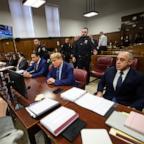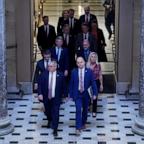Sarkozy Arrives in Moscow to Mediate Crisis
But Medvedev orders Russian defense minister to "destroy" any resistance.
TBILISI, Georgia Aug. 12, 2008— -- Georgian president Mikhail Saakashvilli says he accepts the cease-fire plan with Russia brokered by France
"It is a political document. It is an agreement of principles ... and I think we have full coincidence of principles," Saakashvili told a joint news conference with Sarkozy.
The changes made had been approved by Russian president Dmitry Medvedev and included removing a reference to talks on the future status of South Ossetia, the two men said.
Some sticking points remain, including the status of Russian peacekeepers in Georgia's breakaway provinces of South Ossetia and Abkhazia.
Medvedev decided today that his tanks and air raids had dished out enough punishment to the country of Georgia and called a halt to five days of devastating attacks.
Medvedev ended the onslaught against the former Soviet republic, just as French President Nicolas Sarkozy arrived in Moscow to mediate a truce between the two countries.
But Russian forces had already kicked Georgian troops out of the breakaway province of South Ossetia, surged across the border on two fronts to seize Georgian towns, police stations and military bases, and pounded military installations deep inside Georgia with swarms of warplanes.
Before peace talks began, Russian Foreign Minister Sergey Lavrov said Russia would not deal with Saakashvilli, a staunch U.S. ally, and said that Saakashvili should leave office.
In calling an end to the Russian assault, Medvedev told Russian TV, "The security of our peacekeepers and civilians has been restored. The aggressor has been punished and suffered very significant losses."
He also gave a blunt warning to Georgia by publicly ordering Russia's defense minister to be ready to resume attacks, "If there are any emerging hotbeds of resistance or any aggressive actions, you should take steps to destroy them."
Georgian Prime Minister Lado Gurgenidze told Reuters that Russian jets were still on the attack, bombing two Georgian villages just outside the South Ossetia border.
"We will need more evidence, everyone in this situation needs a signed binding agreement," Gurgenidze said.
U.S. Secretary of State Condoleezza Rice also suggested that the Russians were still pressing their offensive.
"The Georgians have agreed to a ceasefire," Rice said in a terse news conference. "The Russians need to stop their military operations as they have apparently said that they will, but those military operations really do now need to stop because calm needs to be restored."
Medvedev said any final deal must include Georgia withdrawing all of its troops from South Ossetia and promising not to use violence to settle the dispute over its rebel province.
He also insisted that Russian troops would remain in South Ossetia and in a second breakaway Georgian province of Abkhazia, and that both provinces should be able to decide whether they want to be part of Georgia or join Russia.
Saakashvili responded to Medvedev defiantly, saying he would declare South Ossetia and Abkhazia to be "occupied territories."
"No matter what they do, no matter how much they bomb us, no matter how much they cripples us, Georgia will never surrender," Saakashvili vowed.
He charged that Putin and Medvedev want to restore the Soviet Union, which once ruled over Georgia.
"We should never go back to the Soviet Union," Saakashvili declared.
In the Georgian capital of Tbilisi, the streets were packed with people waving red and white Georgian flags, chanting anti-Russian slogans and listening to speakers denounce the Russian offensive. The crowd became angry when a speaker announced that Russians were bombing villages in the north despite the cease-fire, although there was no way to confirm the allegation.




